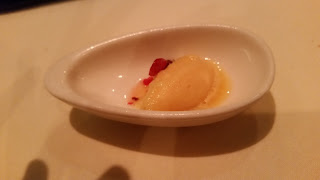I recently went to Alexander's Steakhouse. It's a formerly 1 star Michelin steakhouse in Cupertino, CA. It was amongst the best meals I've ever had. Here's an overview of the meal.
1) Amuse-Bouche
I couldn't recall what kind of fish it was, but this was quite tasty.
2) hamachi shot - truffled ponzu / fresno chili / avocado / ginger / wasabi greens
For appetizers we had their semi-famous hamachi shots and a salmon ceviche that was excellent (no pic of the salmon ceviche).
3) passion fruit sorbet
After the appetizers, we got a this palette cleanser. It was delicious.
Then onto the main course. We ordered several sides along with the main course.
4) uni fried rice - pork belly / ginger / shiitake mushrooms / quail egg / uni
This was delicious.
5) risotto w/ truffles
I'm not a big fan of truffles, so
I didn't like the risotto that much. So take my review of the risotto
with a grain of salt.
6) Hyogo, Kobe Japan A5 wagyu steak with lobster risotto
For the entree, I had their Hyogo, Kobe Japan A5 wagyu steak.
Holy crap! I've never had steak that soft and buttery before. It tasted incredible and unlike any steak I've ever had before. As you can see in the picture, it was cooked perfectly medium-rare. I assume it was sous-vided.
7) cotton candy
Alexander's Steakhouse always gives out complimentary cotton candy at the end of the meal, although I forget the flavor they had this particular day.
The highlight of the meal was unquestionably the Kobe beef. I had tasted Kobe beef before at Craftsteak in Las Vegas several years ago, but it didn't taste like this. Obviously the steak could have been cooked differently or it could have been a different cut, but I didn't expect a difference this large.
So I began researching why it tasted so different when I came upon this article:
Food's Biggest Scam: The Great Kobe Beef Lie
The article goes into way more detail, but in a very general case the issue is the legal definitions of "Kobe beef" or "Wagyu beef". Much like the "natural" did not mean much on products until the FDA defined it, "Kobe" or "Wagyu" does not have a legal definition. So when you are buying "Kobe beef" are you buying beef from Kobe Japan? What about when you buy "Wagyu"?
The answer is it depends. According to wikipedia's Wagyu page, some non-Japanese breeds of cattle (such as Angus) have been crossbreed with Japanese cattle to produce beef with "Kobe beef" or "Wagyu beef" qualities. Is this what you're getting when you order "Kobe beef" or "Wagyu beef"? Who knows.
Looking at Craftsteak's menu today, I see that they now list both Japanese Wagyu and Domestic Wagyu. I would bet that the "Domestic Wagyu" is the crossbred beef described in the wikipedia page and likely what I had several years back, thus the large taste differential. This isn't to suggest that Craftsteak lied about what they were serving me, the definitions and terms were far hazier back then.
So how do you know the kind of beef you're getting at the restaurant? It's probably best to ask for details and evaluate based on the reputation of the restaurant.
That said, I'm hoping to try the Tajima F1 steak from Australia next time, to see how the crossbreed steak tastes as a comparison.







No comments:
Post a Comment